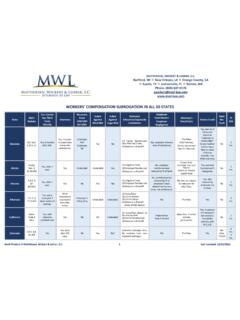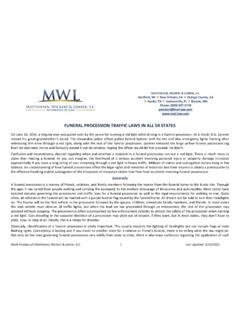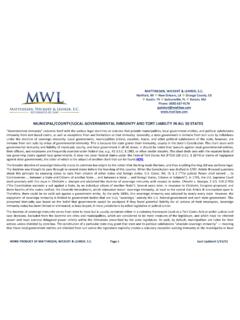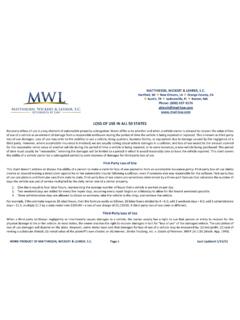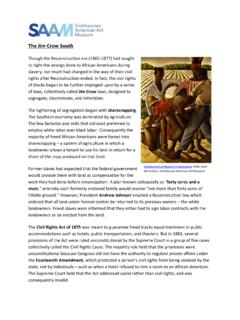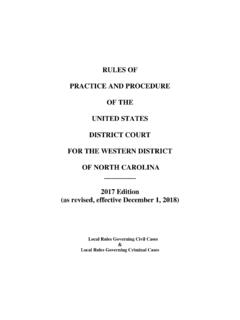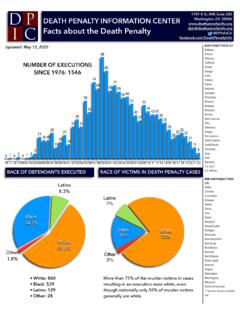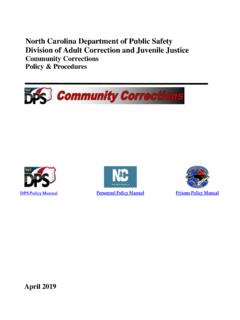Transcription of HOSPITAL LIEN LAWS IN ALL 50 STATES CHART (00215648)
1 WORK PRODUCT OF MATTHIESEN, WICKERT & LEHRER, Page 1 Last Updated 1/13/22 MATTHIESEN, WICKERT & LEHRER, Hartford, WI New Orleans, LA Orange County, CA Austin, TX Jacksonville, FL Boston, MA Phone: (800) 637-9176 HOSPITAL LIEN LAWS IN ALL 50 STATES The advent, development, and implementation of HOSPITAL and health care provider lien laws in the is a subject which has permeated civil litigation and personal injury law. Simply put, a HOSPITAL or health care provider lien is a statutory lien enacted for the benefit of hospitals or health care providers to assist them with the recovery of medical expenses associated with emergency medical treatment.
2 Hospitals or other health care providers are generally allowed to perfect this special lien against any lawsuit, claim, or recovery a patient has against a third-party tortfeasor responsible for causing an injury. HOSPITAL liens are also often referred to as health care provider liens or medical liens. For the sake of simplicity, we refer to them generically as HOSPITAL liens. HOSPITAL lien laws first began making an appearance during the 1930s in order to protect hospitals from the burden of treating uninsured and/or indigent patients and to provide a motivation to treat patients requiring emergency medical care even before they verify the existence of health insurance coverage.
3 This original legislative intent of these lien statutes has gradually eroded but not entirely disappeared as the percentage of those covered by health insurance ( in 1940) has grown exponentially. The most common scenario involving a HOSPITAL lien is when a person requires emergency medical treatment as the result of an automobile accident, and subsequently brings a claim against the responsible driver who caused the accident. Each state has different procedures and requirements for the establishment and enforcement of these liens. Georgia and Texas, for example, require the lien to be filed in specific courts.
4 California and Louisiana, on the other hand, merely require that the lien be served on the interested parties by certified mail. The Texas HOSPITAL and Emergency Medical Services Lien statute (Tex. Prop. Code to ), for example, requires a lien to be filed in the county where the HOSPITAL is located, but is still applicable to recoveries made in other counties, even if suit is not filed. The lien only applies if the patient is admitted to a HOSPITAL or if emergency medical services are provided within 72 hours of the accident. If the patient is transferred to another HOSPITAL , that HOSPITAL may also file a lien if the first HOSPITAL had the right to do so.
5 The lien must state the name and address of the injured person and the date of the accident. It must also state the name and address of the HOSPITAL as well as the name of the at-fault party (if known). Once the lien is filed, the HOSPITAL must mail notice of the lien to the injured person or their legal representative. Once a HOSPITAL secures a valid lien, the HOSPITAL s right to recovery is superior to the patient s right of recovery. If transported by ambulance, an emergency medical services provider (EMS) can also assert a lien, but only in a county of 800,000 or less. The lien does not attach to uninsured/underinsured motorist benefits, Med Pay or PIP benefits, or workers compensation benefits.
6 The amount of the lien is the lesser of (1) the amount of the HOSPITAL s charges during the first 100 days, or (2) 50% of all amounts recovered by the patient through a cause of action, judgment, or settlement. It also includes a doctor s reasonable charges during the first seven (7) days. Every state is different. Some STATES liberally enforce these laws so that technical deficiencies in establishing or seeking enforcement do not defeat recovery by the HOSPITAL . Other STATES are less likely to ignore such deficiencies. WORK PRODUCT OF MATTHIESEN, WICKERT & LEHRER, Page 2 Last Updated 1/13/22 Perfecting HOSPITAL Liens STATES differ on their procedures, but a HOSPITAL lien is generally perfected by filing with the county clerk, the district court, or other government body specified in the HOSPITAL lien statute, written notice of the name and address of the patient, the third-party tortfeasor (if know), the liability carrier (if known), the name and address of the HOSPITAL , and the amount of the lien.
7 Once a notice of HOSPITAL lien is filed in the county where the HOSPITAL is located, the district court/clerk is usually required to maintain a HOSPITAL lien docket that can easily be searched, and in which any HOSPITAL lien claim filed is entered. The district court usually lists the name of the injured person, the name of the person, firm, or corporation alleged to be liable for the injuries and damages, the date and place of the accident, and the name of the HOSPITAL or other institution making the claim. The district court also often maintains an index of the HOSPITAL lien docket under the name of the injured person.
8 Hospitals are often then required to send, by certified mail or other means, written notice of the lien filing to the patient, the third-party tortfeasor, and/or the liability carrier. HOSPITAL liens vary widely from state to state. These variations include such things as whether or not the lien applies to workers compensation claims and/or wrongful death claims. Some STATES ( , Tennessee) limit the percentage of the total settlement that can be recovered under a HOSPITAL lien when the patient is not made whole by the third-party settlement. Other STATES ( , New York and Alabama) require that the treatment occur within a certain time frame in relation to the accident which caused the injury in order for the lien to be able to apply to medical expenses incurred as a result.
9 In other STATES , if an attorney requests a copy of a client s bill and/or medical records, that documentation must be provided free of charge to the attorney, possibly within a limited period of time, or the lien is not valid. The HOSPITAL lien laws of thirty-two (32) STATES provide that an attorney s lien/fee takes precedent over the HOSPITAL lien. These include AL, AK, AZ, AR,GA, ID, IN, IA, KS, LA, ME, MD, MA, MN, MO, MT, NE, NV, NM, NY, NC, OK, OR, RI, SD, TN, TX, UT, VT, VA, WI, and the District of Columbia. Six (6) STATES statutes provide that the HOSPITAL lien takes precedence over all other liens (CA, CO, DE, CT, NJ, NH).
10 Other STATES , like Vermont, provide that the HOSPITAL lien cannot take more than two-thirds (2/3) of the total third-party settlement or $500, whichever is higher, after attorneys fees. Twenty-four (24) STATES have legislated that HOSPITAL liens cannot be recovered from workers compensation settlements. Yet other STATES ( , New Jersey) subordinate a physician s or dentist s lien cannot claim more than 25% of the third-party recovery remaining after a HOSPITAL lien has been repaid. The amount asserted in a HOSPITAL lien has also become a point of contention across the country and varies from state to state. While the law in every jurisdiction allowed plaintiffs in personal injury lawsuits to recover the reasonable value of the medical services incurred, defendants have begun to argue that such medical expenses are neither reasonable nor incurred by the plaintiff because they were paid by a collateral source ( , private health insurance, state Medicaid, Medicare, workers compensation, governmental assistance programs, etc.)




